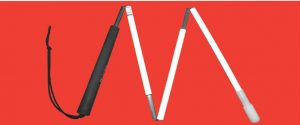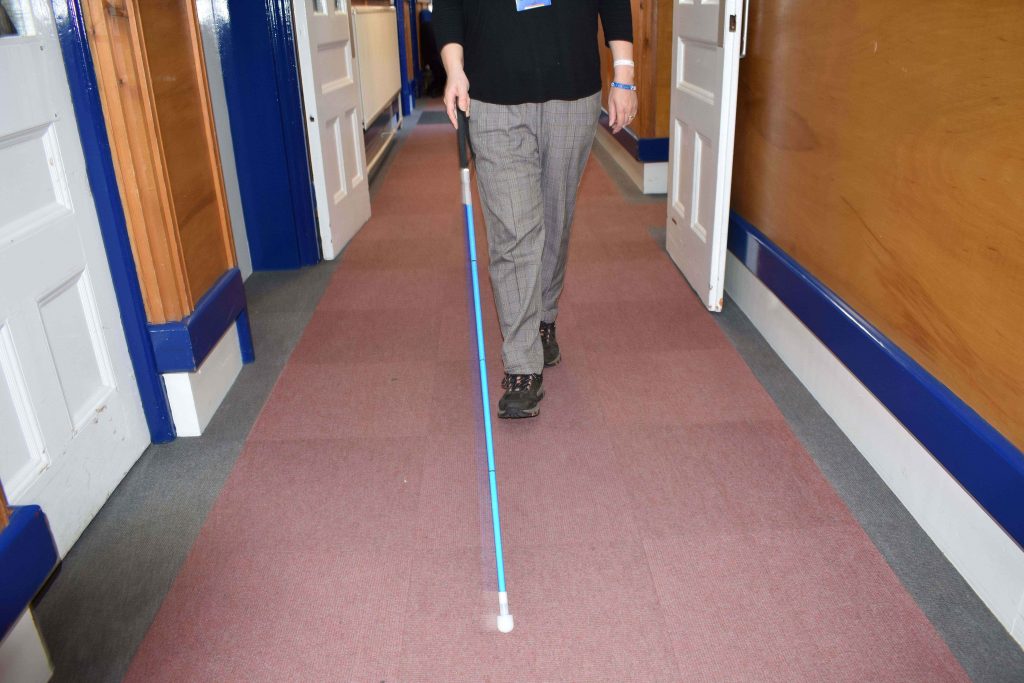More Advantages Than You Can Swipe A Cane At
Article by Paul Hopkins: Transcription, Sales & Advocacy Officer – All Formats

What is This?
A story of the simplicity of a white cane as a mobility aid for blind and partially sighted people; The metaphorical unlocking of many doors; history, scary near misses; happy endings, collaboration and why, on October 15th each year we emphatically celebrate White Cane Safety Day and invite you to join the party.

From Loathing to Loving:
I imagine my own personal and lived experiences are similar to many readings in this post in that I hated my cane to begin with. From unforgettable moments like hearing my dad calling out with his rich Birmingham (Brummie) accent… “Have ya got ya stick?” As we headed out the door, through to the death-defying holiday incident I had as a teenager where I once deliberately dropped my then hated cane off a cliff when with my family, resulting in my having to follow a rusting safety rail along the coastal path before becoming acutely aware of dangling precariously in mid-air with said rusty rail holding my weight as I’d not noticed some coastal path erosion. Thankfully, a quick and successful rescue bid followed by two life-affirming embraces, one from very relieved family members and the other? My subsequent embracing of the white cane and the amazing and liberating mobility aid it is and has turned out to be for me.
Canes, Trains & Planes:
Since those early days and for around 30 years, my numerous canes have taken me on many adventures. From holidays with the family and solo journeys in busy Birmingham while growing up. Then to my college years in Hereford. And on to our capital city for my first job which included learning to navigate myself through the complex London underground metro system. I’ve always loved travel and have visited various countries in Europe and long-haul trips to the US on my own. I currently have a Guide Dog, but, have always kept up my trusty cane skills.

A brief And Fascinating History Lesson:
This humble mobility aid which hasn’t changed that much in its basic form, is essentially a few narrow tubular segments made from any number of materials including aluminium and graphite with a rubberised handle grip at one end, a choice of tips at the other and some sports grade elastic holding it all together, has a more interesting and surprising journey than many people realise!
1921: Bristol-based photographer, James Biggs, is reported to have invented the white cane as a warning aid by painting his walking stick white after an accident that left him blind.
1931: Fully sighted Parisian Guilly d’Herbemont launches a white stick movement in France with the campaign being picked up in British national newspapers. This resulted in a similar scheme being sponsored by Rotary Clubs in the UK. Around the same time, Lions Club International in North America began promoting the use of the white cane. An Impressive side note is that Guilly d’Herbemont herself, funded the purchase of 5000 white canes as part of the movement in France.
Near the end of World War 2: Doctor Richard Hoover, Army sergeant and former teacher at the school for the blind in Baltimore in the US develops the sweeping movement of the cane in front of his feet, to help avoid obstacles, calling it the Hoover method after his surname. This development transitions the cane from an awareness raising device to a fully-fledged mobility aid.
Fast forward over several decades: Where we find notable developments to the white cane which have contended for our attention including various sonic canes from the UK and elsewhere; Talking canes from as far afield as India, Turkey and Russia, and controversially to some, canes in many colours.
July 1999: We carve out a piece of history of our own at Queen Alexandra Charity by becoming the sole UK importer of canes from Revolution Enterprises in California having debuted them at Sight Village during that year. 25 years later, we remain proud to maintain our partnership with the company also known for their kites.
Canes Collaboration – Advantage of Working Together:

My Canes Connections are by no means lost. Part of my role at All Formats centres on forging collaborations with individual blind and partially sighted people within our community; Other connected stakeholders and departments within Queen Alexandra Charity to promote, develop and improve equitable access to goods and services.
All Formats was recently commissioned by QAC Canes to record and produce voiceovers which were used for audio descriptions for their promotional videos. Jennifer B, familiar to you if you have purchased an Revolution Advantage Graphite Cane over the phone or in person from them said: “We worked with All Formats on a series of promotional videos. Not only did Paul star in his own short clip, but he also provided the audio voice overs for the rest of our videos, ensuring they were accessible to all viewers. Working with Paul was an absolute pleasure. He was always willing to assist and seamlessly integrated into the various shots we required. His interview was outstanding; he spoke clearly and concisely, sharing his experiences as a long cane user.”
Thinking of Embarking Upon or Continuing Your Cane Journey?
There is a lot of good advice available from the main charities representing the vision impaired community as to when you might benefit from using a cane; Which cane is right for you and can include mobility training. Additionally, there are online user groups made up of individuals discussing a wide range of subjects such as their cane journeys.
You can order Revolution Advantage Graphite Canes from QAC over the phone using the number 0121 428 5484 or in person at Sight Village. Go here for Paul’s Review of Revolution Advantage Graphite Canes video (youtube.com) Or Visit Revolution Advantage Graphite Canes – YouTube Playlist to explore the wide variety of lengths, colours, types and tip options for available Advantage canes.
I’m Interested in Following in the Footsteps of QAC in Making my Products and Services More Accessible…What Should I Do Next?
Access and inclusion are essential for creating fair, equitable, and vibrant communities where everyone can thrive. Ultimately, coproduction is the bedrock of finding agreement and creating systemic and lasting change for the benefit of everyone in society. At All Formats, the journey starts with a conversation. Talk to us today via the contact details listed to find out how we can help you connect and communicate with a significant minority community of which we are proud to belong.
resource
